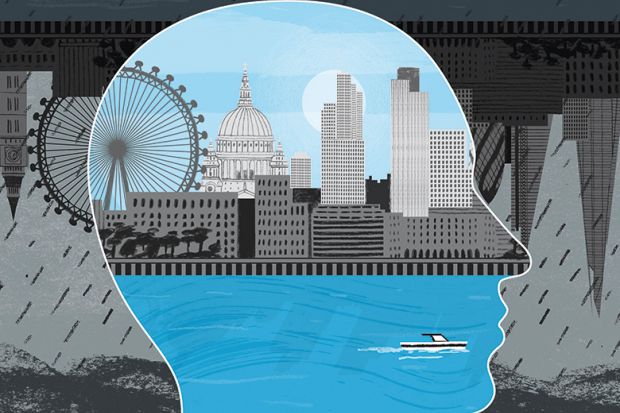I have abandoned, after nearly a lifetime of observation, a principle fundamental to the humanities. “You may go to Nishapur,” declared some pundit of the time of my childhood – was it Richard Hoggart? Raymond Williams? A THE reader will surely be able to tell me. “But you will not get half so much out of it as you will from reading Omar Khayyám.”
The pronouncement impressed my childish mind and, ever since, I have relied on sensibilities deeper than my own to conjure for me times and places I cannot or will not visit. Reading and thinking, rather than going and doing, are my work. At least, they have been until now.
Kant, after all, ranged the cosmos, reputedly without ever leaving Königsberg. Newton, according to tradition, could not find his own way from his room to college hall, but his mind penetrated the recesses of the universe. Gibbon evoked Constantinople vividly, although he never went there. Schliemann knew from fiction a Troy that really existed. I enjoy modestly emulating giants. The past is my métier, and I study most of it without rising from my chair. When I published Millennium: A History of the Last Thousand Years – my first essay in global history – a Liverpudlian friend congratulated me on capturing his native city and was indignant to learn that I had never been there. The Japanese publisher, giving me a celebratory lunch, was aghast to hear that I had never seen Japan and reproached me, in his careful English. “It misleads readers when you describe, as if through your eyes, what you have not seen.”
Such animadversions never deterred me. But now I have lost confidence in my ability to capture distant scenes merely by reading about them. Every year, I spend a semester in London in the service of my US university. When I am in Indiana, typically from June to January, I try to keep in touch with the UK by reading the press and communications from friends. I never repine, because I feel that if, with imagination disciplined by the sources, I can sense what it felt like to be in Tenochtitlan – say – at the approach of Cortés, or Axum when King Ezana drove his slaves through the streets, or in a brothel in Manchuria at the time of the Incident, it is surely possible to sympathise with Britons from a distance of only 4,000 miles and with no more difference in time than longitude imposes. Now I realise I have been wrong. The Britain I have just returned to does not resemble what I thought I would find.
I was expecting a resurgence of that most delightful of traditional British virtues: diffidence. I reckoned that, under clouds of uncertainty, the British would reach for their brollies. I anticipated a sombre mood, in which Britons would rediscover the advantage of pessimism – it indemnifies you against disappointment – and would search for the security of tried and trusted relationships in a disquietingly dangerous world.
I was aware of how much the election of Donald Trump – the incarnation of unpredictability and unreliability – has disturbed even the right-wing media in the UK. Angela Merkel, Mariano Rajoy, even François Hollande will seem lovelier, I supposed, by comparison. I realised, too, that the Queen’s age and health were inducing a feeling of the approaching end of an era. “They will need a new anchor,” I thought, “or, at least, value continuity more, to the advantage of the EU.”
I knew that the threat of resurgent populism and nationalism worldwide was causing alarm. I sensed that prudence must restrain the economy amid the unresolved dilemmas the Brexit referendum created. I thought that growing anxiety at a world prospectively dominated by an unholy alliance of Trump and Vladimir Putin would arouse Britons’ instincts for ethical, internationalist politics, and for allies and partners with decent values. I expected a revulsion from isolationism and narrow-minded self-congratulation.
Instead, I find a government disgustingly eager to enfeoff itself to Trump, a lazily complacent public glazedly intent on self-ruin through madcap spending and a political elite apparently willing to plunge further into uncertainty by endorsing Theresa May’s destructive determination to trigger full secession from the European Union. The Labour Party seems too divided to defy the juggernaut and too pusillanimous in the face of its own unelectability. Conservative MPs seem cowed by the party line. Faced with the facts – that no deal, with the Europeans or anyone else, can be concluded within the period imposed by the invocation of Article 50 and that the UK will therefore be forced out of the union into economic isolation – the government sacks the messengers, stops its ears and embraces prospective disaster.
I acknowledge my fault. I overvalued the reliability of evidence garnered at a remove. I made my assumptions about the UK not only on the basis of refracted data but also of misplaced reason, which hardly applies amid May madness. I let my assumptions about the indefeasibility of wisdom override fears of collective insanity.
Reason and reading need fortification by close-up observation. This insight, if valid, is alarming because not only historical scholarship but all policy formulation, serious decision-making and judgements about potential allies and enemies have to be made at a distance.
I shall go on getting my experience vicariously – but, henceforth, no longer in a search for accurate perceptions, but in retreat from a reality that revolts me.
Felipe Fernández-Armesto is William P. Reynolds professor of history, University of Notre Dame in the US.
POSTSCRIPT:
Print headline: The present, darkly
Register to continue
Why register?
- Registration is free and only takes a moment
- Once registered, you can read 3 articles a month
- Sign up for our newsletter
Subscribe
Or subscribe for unlimited access to:
- Unlimited access to news, views, insights & reviews
- Digital editions
- Digital access to THE’s university and college rankings analysis
Already registered or a current subscriber?




